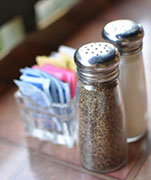- Could Your Grocery Store Meat Be Causing Recurring UTIs?
- Are You Making This Expensive Thermostat Error This Winter?
- Recognizing the Signs of Hypothyroidism
- 10 Strategies to Overcome Insomnia
- Could Artificial Sweeteners Be Aging the Brain Faster?
- Techniques for Soothing Your Nervous System
- Does the Water in Your House Smell Funny? Here’s Why
- Can a Daily Dose of Apple Cider Vinegar Actually Aid Weight Loss?
- 6 Health Beverages That Can Actually Spike Your Blood Sugar
- Treatment Options for Social Anxiety Disorder
Artificial Sweeteners May Raise Blood Sugar Levels: Study


Diabetics and dieters who turn to artificial sweeteners to soothe their sweet tooth may not be doing themselves any favors, a new Israeli study suggests.
Artificial sweeteners can potentially make blood sugar levels rise despite containing no calories, researchers found in human and mouse studies.
That’s because saccharine and its counterparts appear to alter the bacteria residing in the intestines in ways that can impair some people’s ability to process glucose, the researchers report in the Sept. 17 issue of Nature. That means rather than helping the current epidemics of obesity and type 2 diabetes in the United States, artificial sweeteners could potentially be contributing to the problem, according to the study.
The researchers found that mice fed artificial sweeteners developed higher blood sugar levels compared to mice drinking plain water or even water laced with sugar.
They further found that they could bring the mice’s blood sugar levels back to normal by treating them with antibiotics. And, they could induce higher blood sugar levels in healthy mice never exposed to artificial sweeteners by transplanting gut bacteria from mice who had been fed saccharine.
Turning to a group of nearly 400 people, the researchers found that long-term users of artificial sweeteners were more likely to have higher fasting blood sugar levels. They were also more likely to have signs of impaired glucose processing, compared with people who don’t normally use such sweeteners.
In a small follow-up experiment, the researchers tested blood sugar levels of seven people who don’t normally consume artificial sweeteners. The researchers found that four of these people had higher blood sugar levels after consuming the U.S Food and Drug Administration’s maximum recommended daily amount of saccharine for six days straight.
“We were surprised, given the massive consumption and use of artificial sweeteners and their general regard as being safe,” said the study’s co-author Eran Segal, a professor of computer science and applied mathematics at the Weizmann Institute of Science in Rehovot, Israel.
Even though the human and mouse studies mainly focused on saccharine, the first set of mouse experiments also included sucralose and aspartame, Segal said. All three appeared to have the same effect on blood sugar levels in mice.
The researchers said that no one should make immediate dietary choices based on these findings.
“We must stress that by no means are we saying sugary drinks are healthy and should be brought back as a healthy part of our nutrition,” said lead author Dr. Eran Elinav of the Weizmann Institute’s Immunology Department.
But the team found evidence that some people may be more susceptible than others to blood sugar increases caused by artificial sweeteners.
By profiling the bacterial content of a person’s gut, “we could cluster them in a way that would show who would respond and not respond to artificial sweeteners,” Segal said.
Elinav believes that in the guts of those people who developed elevated blood sugar, certain bacteria reacted to the chemical sweeteners by secreting substances that then provoked an inflammatory response similar to sugar overdose, promoting changes in the body’s ability to utilize sugar.
These findings bolster the American Diabetes Association’s position that “using non-nutritive sweeteners is not a panacea,” said Judy Wylie-Rosette, an ADA spokesperson and professor of epidemiology at the Albert Einstein College of Medicine in New York City.
“If you don’t have a carefully planned approach to your diet, artificial sweeteners are not going to provide you much benefit,” Wylie-Rosette said. “If you’re thinking about what you’re eating, it may help some.”
However, artificially sweetened sodas are clearly better than sugary sodas, Wylie-Rosette added, noting that a person drinking a single 20-ounce regular soda is getting close to 20 extra teaspoons of sugar in their daily diet.
“Water is the best alternative, and non-nutritive sweeteners are somewhere in between,” she said. “When you’re thirsty, you need to drink water. Water is the best thirst-quenching beverage.”
More information
For more information on artificial sweeteners, visit the Harvard School of Public Health.
Source: HealthDay
Copyright © 2026 HealthDay. All rights reserved.










